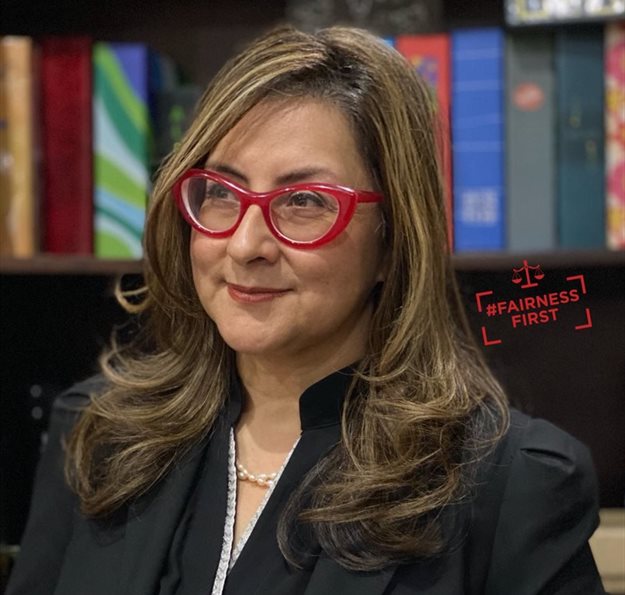#FairnessFirst: In the front line, Nadia Bulbulia

“They also provide a great source of companionship during this unprecedented time of physical distancing.”
As part of our April content feature on radio and podcasts, Bulbulia tells us about the NAB’s work as an industry association for the regulated broadcasting sector and what her frontline role entails, specifically during this unprecedented time, and more about their recently launched Free Radio Initiative gender-based violence campaign, ‘Turn Down Your Radio’.
She also welcomes the introduction of the Lalela Radio Awards, founded by industry veteran Lance Rothschild, and goes further to say that the NAB believes there’s room to broaden award categories to reward a greater diversity of talent. “The gains in areas such as gender, LGBTQI+, youth, disabilities and unique local programme genres, for example, could be strengthened.”
Comment on the NAB’s work as an industry association for the regulated broadcasting sector.
The NAB is a non-profit that was established at the dawn of South Africa’s democracy to foster a favourable climate for a sustainable and vibrant broadcasting industry.
Its membership includes all three tiers of broadcasters (public, commercial and community) as well as signal providers and industry associates.
As a highly regulated sector, the NAB plays a vital role in representing the industry on various policy and regulatory processes. These are aimed at advocating for a fair regulatory regime to enable a viable, diverse and robust industry.
It established the Broadcasting Complaints Commission of SA (BCCSA) as far back as 1993 as a self-regulatory complaints directorate.
In 2014 it facilitated the establishment of the Broadcast Research Council (BRC) for audience research.
The NAB also conducts regular surveys and research to support its policy and regulatory interventions.
It works on a consensus basis and focuses on principle issues and concerns that impact on the industry as a whole.
It is recognised as the voice of South Africa’s broadcasting industry.
What does your role entail?
As the executive director, I head the organisation and deliver on the needs, strategy and mission of the NAB members.
The NAB is a small organisation so I oversee all areas of the daily operations, from finance to HR, IT and the management of external service providers.
My role entails both internal and external stakeholder management, submissions and presentations to government, parliament and regulators on matters that affect the broadcasting industry.
Issues are wide-ranging, from spectrum management to content standards and copyright legislation.
My role also includes public policy, advisory support and creating opportunities for collaboration.
The NAB works through standing committees with its Executive Committee as the decision-making body. I, therefore, work closely with the NAB Exco and I am supported by a lawyer and a dedicated admin team who assist with committee processes and projects.
Comment on the current state of the industry and the impact of the coronavirus/Covid-19 on the industry.
The broadcasting industry is an essential service under the national state of disaster framework.
Radio and television services are critical in providing communication and information during this unprecedented time in our country and the world.
The industry has responded effectively and with a great sense of urgency in providing public service announcements and educational campaigns on the coronavirus.
The impact of Covid-19 on the broadcasting industry is still being assessed. However, there has already been a significant decline in advertising revenues.
Broadcasters are operating under severe constraints with reduced staff and production companies having closed.
Despite this, licensees remain committed to providing information, education and entertainment throughout the lockdown period. They have also been called on to broadcast educational programmes to support both junior and senior school curricula. Additional time on schedules and even additional channels, have been requested by government.
As frontline services, the employees of our members put themselves at great risk to cover Covid-19 developments. They have been innovative in filing stories from home. The convergence of technologies has enabled opportunities for online interviews.
The NAB is participated in government work-streams on Covid-19 ICT regulations and it has pointed to the challenges facing the industry at this time. It is hoped that government and the regulator will consider regulatory relief measures to assist the industry.
What is your/the NAB’s stance on the introduction of a new radio awards programme, the Lalela Radio Awards?
The NAB is supportive of all awards programmes that celebrate and acknowledge excellence in the radio sector. The industry is encouraged by the introduction of the Lalela Radio Awards.
In November you told The Media Online that the industry body was not in partnership with either radio awards party but welcomed the opportunity to input into the processes toward improving on the range and diversity of award categories. Please elaborate.
The NAB is of the view that there is definitely room to broaden award categories to reward a greater diversity of talent. The gains in areas such as gender, LGBTQI+, youth, disabilities and unique local programme genres, for example, could be strengthened.
Tell us more about the Free Radio Initiative and why this was launched?
The Free Radio Initiative (FRI) is a brand-agnostic campaign under the umbrella of the NAB Commercial Radio Committee. It was developed in response to the abhorrent escalation of GBV in our country.
The idea of pledging free airtime and resources to create national awareness campaigns aimed at impacting meaningful change on various public concerns was immediately supported.
Issues such as racism and xenophobia were also discussed. Our members are committed to working collaboratively on public interest issues that advance the values of our constitutional democracy.
This is essentially how the FRI was established.
Tell us more about the recently launched FRI GBV campaign, ‘Turn Down Your Radio’.
As the world focuses its attention on the devastating Covid-19 pandemic and lockdown measures are put in place, we have regrettably seen an increase in GBV both locally and globally.
The UN Secretary-General recently remarked that since restrictions imposed around the world, women and girls are increasingly facing violence where they should be safest – in their own homes.
In an unprecedented move to fight the relentless onslaught of GBV in South Africa, our members launched the ‘Turn your radio down’ campaign on 15 April.
The call is to turn your volume down by turning your attention up. The aim is to raise awareness and to encourage proactive steps by ordinary citizens to help identify and curb GBV.
The response to the campaign is really encouraging with 16 radio stations across the country participating.
When will the next campaign pledge process open, if it hasn’t already and what is the theme?
The primary focus right now is on bolstering government campaigns on Covid-19 and until such time that resources can be freed up, no new theme or pledge process will be considered.
Is this a once-off or ongoing initiative?
In light of the impact of Covid-19, our members will assess the feasibility of additional initiatives later in the year.
Follow .za @NAB_SouthAfrica and Bulbulia @nbulbulia on Twitter.



































